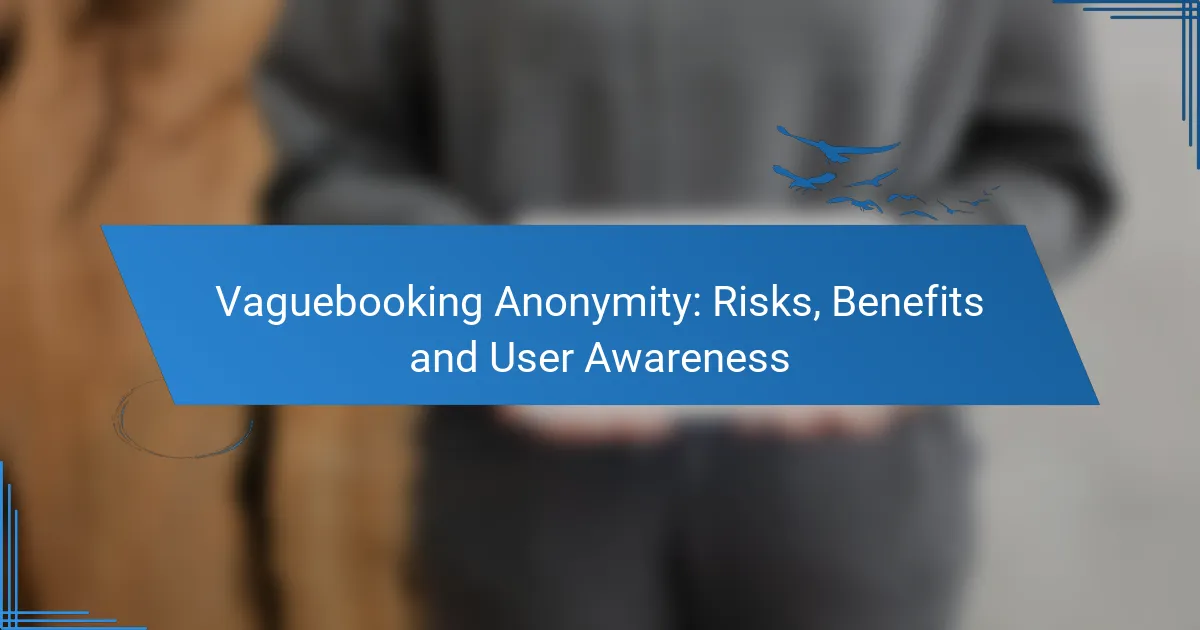Vaguebooking anonymity offers users a unique platform to express their thoughts and emotions without revealing their identity, promoting a sense of freedom and emotional relief. However, this practice carries risks, including potential misunderstandings and negative impacts on personal relationships. By fostering awareness of the implications of ambiguous posts, users can better navigate the emotional landscape of social media and minimize unintended consequences.
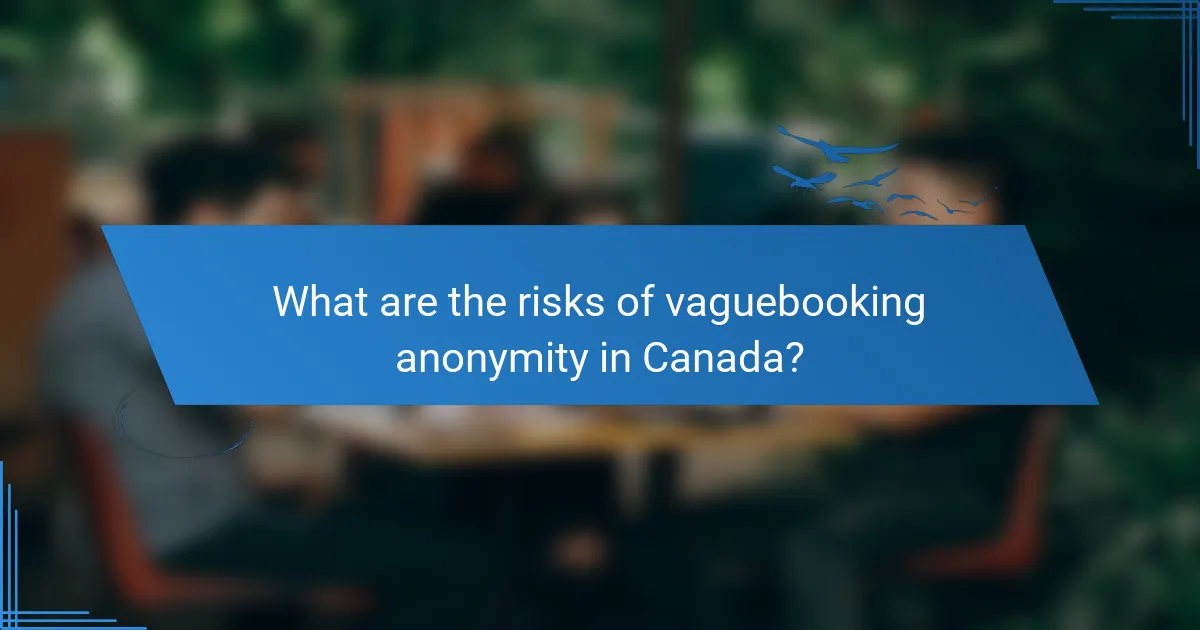
What are the risks of vaguebooking anonymity in Canada?
The risks of vaguebooking anonymity in Canada include potential misunderstandings, negative effects on personal relationships, and privacy issues. Users may not fully grasp the implications of posting ambiguous content without context, leading to unintended consequences.
Potential for misinterpretation
Vaguebooking often leads to misinterpretation, as readers may project their own meanings onto unclear posts. This can result in confusion and unnecessary speculation about the poster’s intentions or feelings. For instance, a post about feeling “lost” might be interpreted as a cry for help, even if the user simply meant they were having a rough day.
To mitigate this risk, users should consider the clarity of their messages. Providing a bit more context can help prevent misunderstandings and foster more meaningful interactions.
Impact on personal relationships
The ambiguity of vaguebooking can strain personal relationships, as friends and family may feel excluded or concerned about the poster’s emotional state. If someone frequently posts vague updates, others might feel compelled to inquire about their well-being, which can lead to awkward conversations or resentment.
To maintain healthy relationships, users should be mindful of how their posts might affect others. Open communication about feelings or situations can be more beneficial than cryptic updates.
Privacy concerns
Anonymity in vaguebooking can create privacy risks, as users may inadvertently share sensitive information. Even if a post seems harmless, it could reveal personal details that others can piece together, leading to unwanted attention or harassment.
To protect privacy, users should think critically about what they share online. Avoiding specific identifiers and being cautious about emotional disclosures can help maintain a safer online presence.

What benefits does vaguebooking anonymity offer?
Vaguebooking anonymity allows users to express their feelings and thoughts without revealing their identity, fostering a sense of freedom. This can lead to emotional relief and engagement with others while minimizing the risks associated with accountability.
Emotional expression without accountability
Vaguebooking enables individuals to share their emotions without the fear of judgment or backlash. Users can post ambiguous statements about their feelings or situations, allowing them to vent or seek support without disclosing personal details.
This anonymity can be particularly beneficial for those dealing with sensitive issues, such as mental health struggles or relationship problems. It provides a safe space to explore feelings and receive feedback without the pressure of revealing one’s identity.
Increased engagement from peers
When users post vague updates, it often piques the curiosity of their friends and followers, leading to increased interaction. Peers may comment or reach out, offering support or asking for clarification, which can create a sense of community and connection.
This engagement can be a double-edged sword; while it fosters interaction, it may also lead to misunderstandings or unwanted attention. Users should be mindful of how their vague posts might be interpreted and consider the potential for both positive and negative responses.
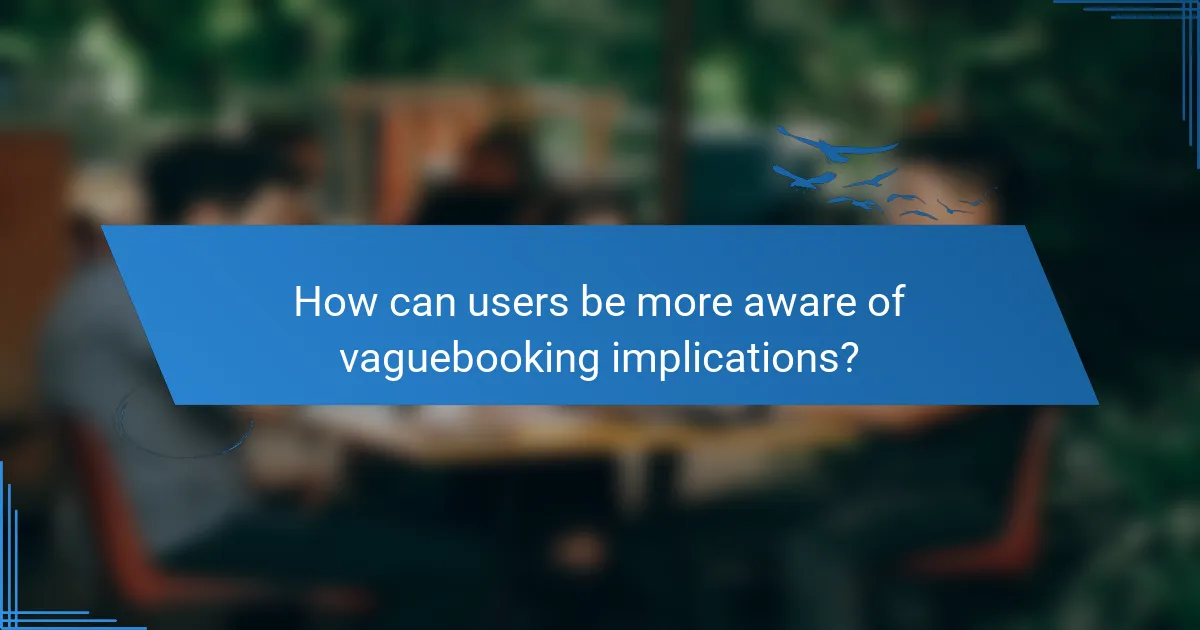
How can users be more aware of vaguebooking implications?
Users can enhance their awareness of vaguebooking implications by understanding how their posts may be perceived by others and recognizing the emotional triggers that drive such behavior. This awareness can help mitigate misunderstandings and emotional distress that may arise from ambiguous social media updates.
Understanding audience perception
When vaguebooking, users should consider how their audience interprets ambiguous messages. Friends and followers may fill in the gaps with their assumptions, which can lead to miscommunication. For instance, a post like “Feeling lost today” might prompt concern or speculation about personal issues, even if the user intended a lighter sentiment.
To manage audience perception effectively, users can clarify their intent through follow-up posts or comments. Engaging directly with friends about their feelings can also help prevent misunderstandings and foster supportive conversations.
Recognizing emotional triggers
Emotional triggers often drive vaguebooking, as users may seek validation or sympathy without explicitly stating their needs. Recognizing these triggers can help individuals understand their motivations for posting vague updates. For example, someone feeling lonely might post something cryptic to elicit responses from friends, hoping for reassurance.
To navigate this, users should reflect on their emotional state before posting. A simple checklist can help: ask if the post is meant to seek support, if it could be misinterpreted, or if it might lead to unwanted attention. This self-awareness can guide more thoughtful and clear communication on social media.
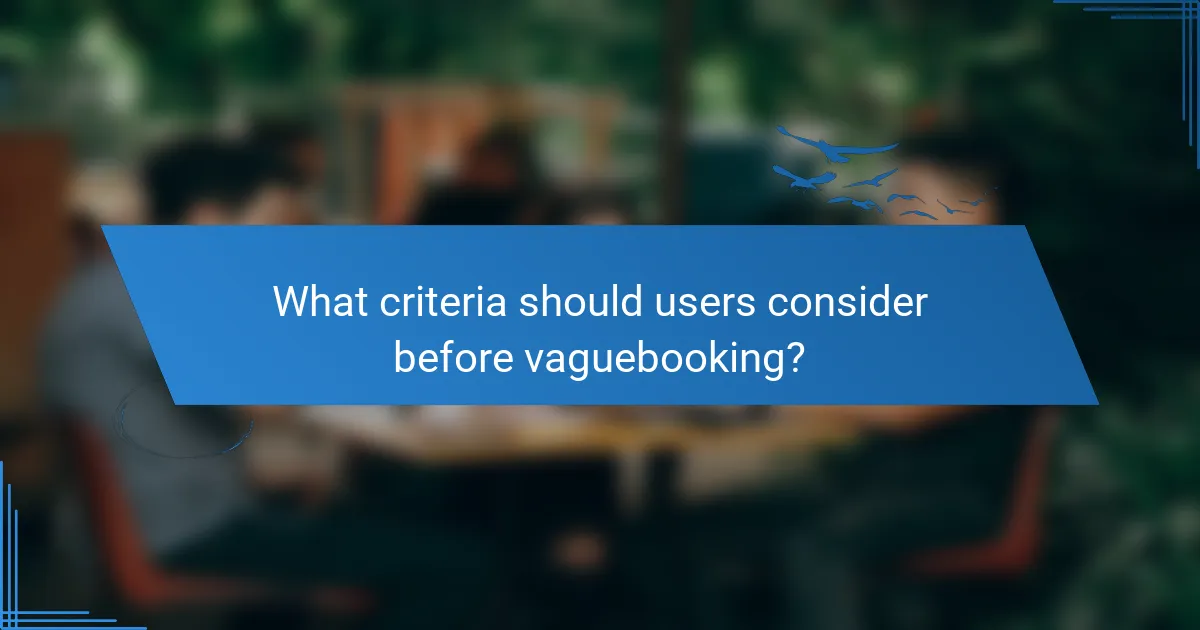
What criteria should users consider before vaguebooking?
Before engaging in vaguebooking, users should evaluate their intentions and the possible outcomes of their posts. Understanding personal motives and the implications of sharing ambiguous content can help mitigate risks and enhance user experience.
Assessing personal motives
Identifying why you want to vaguebook is crucial. Are you seeking attention, support, or simply expressing frustration? Clarifying your motives can help you decide if vaguebooking is the right approach or if a more direct communication method would be more effective.
Consider whether your post serves a constructive purpose or if it may lead to misunderstandings. If your goal is to elicit concern or provoke curiosity, be aware that this can lead to unwanted attention or speculation.
Evaluating potential consequences
Vaguebooking can have various repercussions, both positive and negative. On one hand, it may foster connections with friends who reach out to offer support. On the other hand, it can create confusion or anxiety among your audience, leading to misinterpretations of your feelings or situation.
Think about how your vague post might affect your relationships. Friends may feel compelled to ask questions or offer help, which could be uncomfortable if you’re not ready to share more. Weigh the benefits of sharing against the potential for unintended fallout.
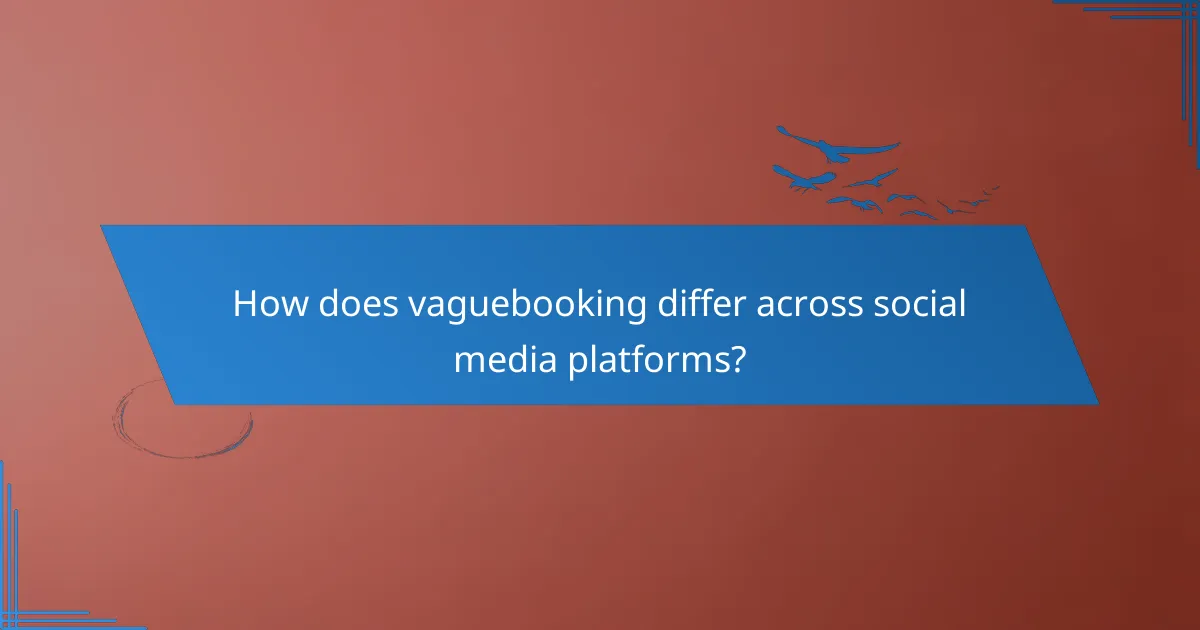
How does vaguebooking differ across social media platforms?
Vaguebooking varies significantly across social media platforms, influenced by each platform’s unique culture and user expectations. While Facebook often serves as a space for ambiguous emotional expressions, Instagram leans towards visual storytelling that can also convey unclear messages.
Facebook’s culture of vaguebooking
On Facebook, vaguebooking typically involves users posting cryptic status updates that hint at personal issues or feelings without providing specific details. This practice can generate curiosity and engagement from friends, often leading to comments asking for clarification.
Common examples include phrases like “Feeling lost” or “Not sure what to do next,” which invite responses but reveal little. Users should be cautious, as this can lead to misunderstandings or unwanted attention, especially if the post is interpreted in various ways.
Instagram’s visual ambiguity
Instagram’s approach to vaguebooking is primarily visual, where users share images or stories that evoke emotions or situations without explicit context. A photo of a sunset with a caption like “Sometimes you just need to let go” can leave followers guessing about the underlying meaning.
This visual ambiguity can foster a sense of connection among followers, as they may relate to the emotions conveyed. However, it can also lead to misinterpretations, so users should consider how their images might be perceived and whether they truly communicate their intended message.
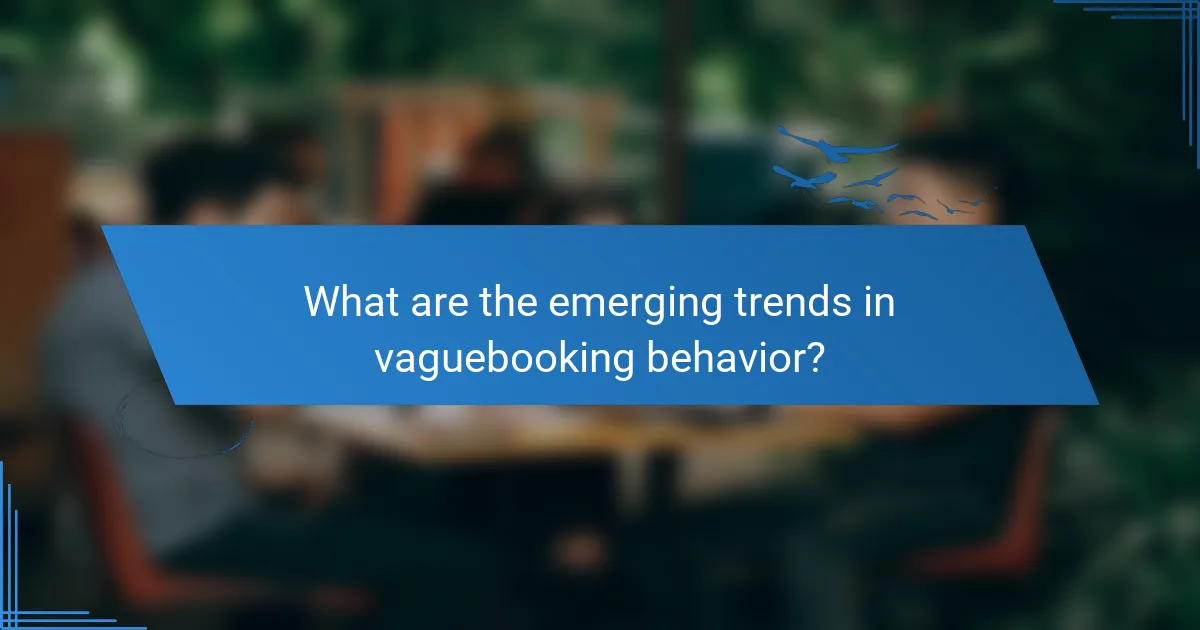
What are the emerging trends in vaguebooking behavior?
Emerging trends in vaguebooking behavior indicate a shift towards more ambiguous social media posts that invite speculation and engagement. Users often share cryptic messages to express emotions or seek validation without revealing specific details, reflecting a complex interplay of privacy and social interaction.
Shift towards transparency
Despite the trend of vaguebooking, there is a growing movement towards transparency among social media users. Many individuals are opting to share more direct and honest posts about their experiences, particularly in response to societal pressures for authenticity. This shift can enhance trust and connection among followers.
For example, users may choose to discuss their struggles openly rather than hinting at them, fostering a supportive online community. This trend can be seen across various platforms, where hashtags promoting mental health awareness encourage candid discussions.
Impact of mental health awareness
The rise in mental health awareness has significantly influenced vaguebooking behavior. As more people recognize the importance of mental well-being, they may use vague posts to signal distress or seek help without explicitly stating their issues. This can create a double-edged sword, as it may lead to misunderstandings or misinterpretations.
Social media campaigns advocating for mental health can encourage users to be more open about their feelings. However, it is crucial for individuals to strike a balance between seeking support and maintaining their privacy, ensuring that their posts do not unintentionally alienate their audience.
